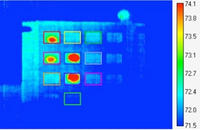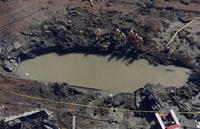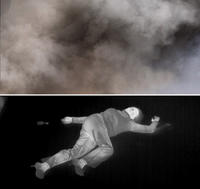-
General Dynamics teams up with Virginia Tech to bolster cybersecurity
Defense giant General Dynamics’ cybersecurity division has teamed up with Virginia Tech to help strengthen the nation’s cybersecurity research capabilities; on Wednesday, the company announced that its Advanced Information Systems branch will assist Virginia Tech with its new Security and Software Engineering Research Center (S2ERC)
-
-
BAE Systems shows invisibility cloak-wrapped vehicle
BAE Systems has tested an invisibility cloak that allows a vehicle to blend into its surroundings; sheets of hexagonal “pixels,” which can change temperature very rapidly, allow vehicles — even moving tanks — to match their surroundings, thus making them invisible
-
-
Exports of U.S. advanced technology products suffer less in recession
Advanced technology products (ATP) exports fell from $270 billion in 2008 to $245 billion in 2009 — but this 9 percent drop was less than half the decline of non-ATP exports
-
-
Terrahawk showcases its mobile surveillance vehicle
This Thursday Terrahawk, LLC will show off its Mobile Utility Surveillance Tower (MUST) to members of the U.S. House of Representatives and the Senate along with their staffs; with MUST, law enforcement agencies can quickly set up a mobile surveillance tower for emergency response, crowd control, or general surveillance
-
-
Cutting soot emissions fastest, cheapest way to slow warming
Reducing soot emissions from diesel engines and other sources could slow melting of sea ice in the Arctic faster and more economically than any other quick fix; the good news is that decreasing soot could have a rapid effect — unlike carbon dioxide, which remains in the atmosphere for years, soot disappears within a few weeks, so that there is no long-term reservoir with a continuing warming effect
-
-
Thermal imaging allows ATM theft from a distance

ATMs’ PINs can be stolen using thermal imaging cameras; when ATM customers press down keys to enter their personal code number, they leave behind residual heat from their fingertips; thermal imaging cameras can catch these numbers
-
-
Tomato giant fined for hiring illegal workers
Last week, the largest year-round grower of greenhouse tomatoes in the United States was fined $600,000 for knowingly hiring undocumented workers; Eurofresh Inc., pled guilty to the charges of employing illegal workers and now faces a five year probation
-
-
Report finds poor management cause of San Bruno natural gas explosion

An investigation into the cause of a natural gas pipeline explosion that killed eight people and destroyed dozens of homes in San Bruno, California, placed the blame squarely on fifty-four years of bad management by Pacific Gas & Electric Company (PG&E) and the failure of state and federal regulators to notice the problem
-
-
IBM acquires security threat, fraud detection software developer
Acquisition extends IBM’s menu of offerings for governments, law enforcement, retail, insurance, and healthcare clients in what the company describes as “the Era of Smarter Cities”
-
-
Lawmakers struggling to end critical medicine shortage
Critical shortages for medicines needed in treating life-threatening illnesses have lawmakers and public health officials scrambling to find solutions; this year alone, a record high of more than 180 drugs crucial for treating childhood leukemia, breast and colon cancer, infections, and other diseases have been declared in short supply
-
-
2011 disasters cause $55 billion in damages in U.S.
This year’ natural disasters could cost the United States as much as $55 billion; prior to Hurricane Irene, the National Oceanic and Atmospheric Administration’s National Climatic Data Center estimated that the nine major natural disasters to hit the United States earlier this year caused an estimated $35 million in damages
-
-
More than $70 million Irene damages in N.C., hits farmers hard
As North Carolina begins to recover from the deluge of rain and high winds of Hurricane Irene, Governor Beverly Perdue estimates that the storm caused more than $70 million in damages; Farmers near coastal areas were hit particularly hard with many reporting total losses
-
-
Anthrax forensics help ID source of Haitian cholera outbreak
Researchers have discovered the source of the deadly cholera outbreak in Haiti that killed more than 6,000 people and sickened 300,000; the study determined that Nepalese peacekeepers brought cholera to Haiti, when they came to assist the country’s rebuilding efforts following the massive earthquake in January 2010
-
-
DRC wins DHS contract to help protect federal, state, and local agencies
On Tuesday Dynamics Research Corporation (DRC) announced that it had won a new blanket purchase agreement with the General Services Administration and DHS to provide a range of support services to federal, state, and local government agencies
-
-
Vumii unveils new thermal imaging cameras

Vumii, a firm that specializes in developing surveillance cameras, recently announced the addition of four new thermal imaging camera lines, expanding on its existing line of LED and laser-illuminated cameras
-
More headlines
The long view
Factories First: Winning the Drone War Before It Starts
Wars are won by factories before they are won on the battlefield,Martin C. Feldmann writes, noting that the United States lacks the manufacturing depth for the coming drone age. Rectifying this situation “will take far more than procurement tweaks,” Feldmann writes. “It demands a national-level, wartime-scale industrial mobilization.”
Trump Is Fast-Tracking New Coal Mines — Even When They Don’t Make Economic Sense
In Appalachian Tennessee, mines shut down and couldn’t pay their debts. Now a new one is opening under the guise of an “energy emergency.”
Smaller Nuclear Reactors Spark Renewed Interest in a Once-Shunned Energy Source
In the past two years, half the states have taken action to promote nuclear power, from creating nuclear task forces to integrating nuclear into long-term energy plans.
